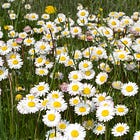‘‘There is sufficient scientific evidence that homoeopathy strengthens the energy and vitality of plants even under conditions of abiotic stress and promotes a dynamic balance of the plant with soil, water and the environment.
Homoeopathic dilutions from different origins can be applied by soaking seeds and spraying leaves or directly to the soil or substrate. Like any living organism, plants have a genetic memory, which is continuously enriched.
The response of plants treated with homoeopathy is natural, lasting and without the negative side effects that some agrochemicals have, which can even accumulate in their tissues and affect the safety of the harvested product, which makes it unfit for human consumption.
Undoubtedly, homoeopathy has great potential, not only in human public health and aquaculture and veterinary production but also in organic, ecological and sustainable agriculture, which will be essential for the future development of humanity’’1
Homeopathy in agriculture articles
Homeopathy & Plants
Homeopathy is gaining worldwide momentum due to rigorous scientific research in human, animal and plant models. In plants, homeopathy optimizes growth and development with scientifically proven crop results validating its ability to produce extra abundant growth, foliage, and flowers, resulting in increased crop yields.
Homeopathy plant remedies (with cases)
Homeopathy & Blackthorn
Prunus spinosa L., known as blackthorn or sloe berry. Blackthorn fruit contain a myriad of bioactive polyphenolic compounds, including phenolic acids, flavonoids, and anthocyanins. The fruits must be prepared - as in sloe gin - due to poisonous seeds which must be removed.
Homeopathy & Arnica montana
Arnica montana L. (Asteraceae) is an herbaceous perennial plant growing wild across the mountains of Europe and included on the International Union for the Conservation of Nature endangered species list with regulated harvesting confined to just several areas in France and Germany.(1)
Happy reading !
‘In contrast to frequent claims, the available MAs of homoeopathy in placebo-controlled randomised trials for any indication show significant positive effects beyond placebo. Compared to other medical interventions, the quality of evidence for efficacy of homoeopathy was similar or higher than for 90% of interventions across medicine.2 Accordingly, the efficacy evidence from placebo-controlled randomised trials provides no justification for regulatory or political actions against homoeopathy in health-care systems.’3
Aude sapere !
Manuel et al., 2019. Agricultural Homoeopathy: A New Insight into Organics. J. Moudrý et al. (eds.), Multifunctionality and Impacts of Organic and Conventional Agriculture, IntechOpen, London. Available from: https://www.intechopen.com/chapters/65759
Howick et al., 2022. Most healthcare interventions tested in Cochrane Reviews are not effective according to high quality evidence: a systematic review and meta-analysis. J Clin Epidemiol. Aug;148:160-169. Available from: https://pubmed.ncbi.nlm.nih.gov/35447356/
Hamre et al., 2023. Efficacy of homoeopathic treatment: Systematic review of meta-analyses of randomised placebo-controlled homoeopathy trials for any indication. Systematic Rev. 2023 Oct 7;12(1):191. https://systematicreviewsjournal.biomedcentral.com/articles/10.1186/s13643-023-02313-2#Abs1















This is so cool! I have a homeopath friend who plans to work exclusively with plants when she retires…so much to explore there